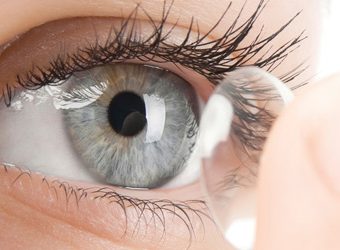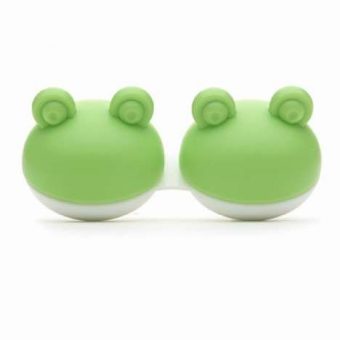Although I have not encountered anything too horrific with regards to contact lens patients, this post was inspired by a recent conversation I had with a friend over dinner. He hadn’t seen his optometrist in years (I won’t say how many because it’s pretty bad) and the only reason he was going back was because he was on his last pair of contact lenses. A lot of these mistakes were things he was doing not knowing they were contact lens taboos – I was surprised that he hadn’t encountered any issues during his optometrist hiatus. More commonly than not, his contact lens habits would have landed him an infection at the very least.
1. Over Wearing Contact Lenses
This occurs when a contact lens wearer decides to attempt to stretch out the use of their lenses (whether it be daily, bi-weekly, or monthly). They attempt to re-use their daily disposables the next day and day after, extend the wear of their bi-weeklies to a month or more, and extend their monthlies past their 30 days.

This happens most commonly to people who don’t purchase their year’s supply of contact lenses – they decide that they either don’t want to spend that much or that it’s okay to stretch the use of lenses. It is not okay to over-wear contact lenses because the longer you over wear the lenses, the higher the likelihood of those contact lenses harbouring bacteria that can feed on your cornea and cause infections.
To avoid this issue, it is best to purchase a full year’s worth of contact lenses at the time of your yearly eye exam – this way you have enough lenses and you also qualify for the manufacturer rebates that are not available online. This way, when you’re out of lenses you know it is time to get your eyes checked and can renew your supply at that time.
2. Re-using contact lens solution
This only applies to people who wear bi-weeklies and monthlies. However, if you’re wearing dailies the wrong way (ie. re-using the lenses the next day), you could also be doing this. If that’s the case then you should probably throw out your case and solution all-together to avoid doing this at all. For the others, what I mean by re-using solution is saving the solution you’ve used the night before for the next day. Every time you are inserting your lenses you should be dumping out the solution in the cases and allowing it to air-dry. Fresh solution should be used to store your lenses over-night at all times.
If you don’t use fresh solution, you are providing a nice moist environment for bacteria to grow and feed. When your lenses are placed in the used solution, there is a chance that the bacteria from the old solution will transfer to your eyes and cause an infection.

3. Never purchasing new contact lens cases
A lot of the time people don’t know that they have to change their contact lens cases every 2-3 months. They will continue to use the same case for several months or even years thinking that it’s perfectly clean; however, that is not the case. The contact lens case is only another breeding ground for bacteria to grow – the longer you keep the case the longer the bacteria are allowed to feed and multiply.
If you’ve ever skimmed your finger over the well of the contact lens case and felt a slight film, that is a huge indication that your case is harbouring bacteria and it needs to be changed. A good rule of thumb is to change the case every 2-3 months to avoid this problem.
4. Using spit/water to re-moisten your lens
When your contact lenses happen to fall out during the day, it’s not a good idea to use your own spit (or anyone else’s for that matter) or water because there are a lot of bacteria in the spit and water that you do not want in your eyes. The types of infections you can get from this can be sight-threatening and can sometimes be hard to diagnose in a timely manner.
Best way to avoid this issue all-together is to carry spare contact lenses with you, carry your glasses with you, or have a small travel-sized bottle of your preferred contact lens solution with you. This way, you have all your bases covered in the event that your contact lenses fall out. On another note, if this is happening to you on a daily, weekly, or monthly basis it’s an indication that you either have an ill-fitting lens or you need a lens that your eyes can handle longer periods of wear-time in. If that’s the case, tell your optometrist that you are having this problem and see if they can find a better lens for your life-style.
5. Sleeping in contact lenses
I find a lot of patients don’t do this on purpose and it’s okay if you happen to fall asleep once in a while, but it’s best if this habit is avoided. There are lenses that are approved for 24 hour wear but I have never recommended my patients sleep in their lenses even in the ones that are approved for it. Simply because it increases the chances of infection and decreases the amount of oxygen and nutrients your corneas are getting while you’re asleep.

If your corneas are being suffocated by the contact lenses, corneal neovascularization (new blood vessel growth) will occur. Normally your corneas are avascular (no blood vessels); however, in the event that they are not receiving what they need, they will allowblood vessels to grow on to it to supply what it isn’t getting naturally. Worst case scenario, these blood vessels can grow as far as blocking your line of sight. If the neovascularization is caught early enough and contact lens wear is discontinued, the blood vessels can regress.
6. Water activities with contact lenses

The reason why water activities should be avoided when wearing contact lenses is due to the alarming number of bacteria that can be contracted from the water (whether it be public chlorinated pools, beaches, hot tubs, or showers). It is best to not wear contacts for these types of activities but if you need to be wearing contacts, it is best to use daily disposables for these activities. This way, if anything does get caught in the contact lens, it is disposed of rather than left to grow on the contact lens. Again, these types of infections can cause you to lose your vision if not caught early enough and are often hard to diagnose during their early stages.
Hopefully this blog post was informational for you. If you or anyone you know happens to be doing any of these things, please tell them to change their habits. There are more bad habits I could talk about but I thought I would start with this. It’s not worth getting an infection and possibly losing your sight over something that could have been avoided by making a small change.
If you have any questions, please feel free to comment below and I will answer them to the best of my ability. Also, if you have any other optometry related questions you would like to learn about, please let us know and perhaps it will appear on our next blog post!

